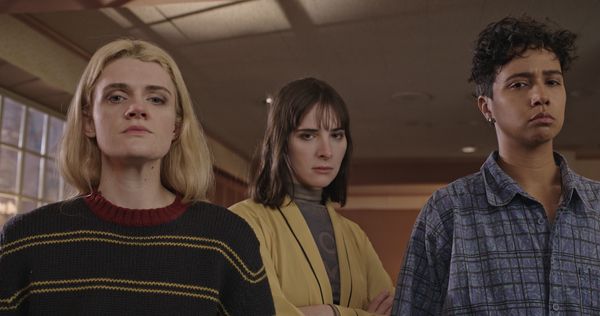 |
| Gayle Rankin, Hari Nef and Rad Pereira in Bad Things Photo: courtesy of Shudder. A Shudder Release |
Nine years ago, Stewart Thorndike burst onto the scene with her début feature Lyle, the story of a young woman recovering from a tragedy who becomes convinced that somebody is trying to harm the child she’s carrying. It was intended as part of a trilogy, and it has taken a long time for her to be able to bring the second part, Bad Things, to the screen, but it’s here at last. It follows four friends who travel to a remote hotel which one of their number, Ruthie (Gayle Rankin) has inherited, and where, unfortunately for them, what was intended to be a fun couple of days before the place is sold turns into a fight for survival.
When we meet, Stewart is delighted to learn that I live in Paisley, the same place that Rankin is from, and laments that she can’t be present because of the strike. She begins our interview by explaining how her series of films works.
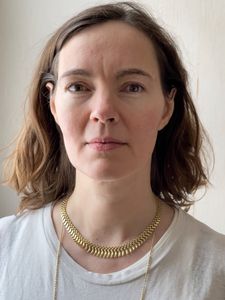 |
| Stewart Thorndike, director of Bad Things. Photo: Courtesy of Lida Suchy. A Shudder Release. |
“I'm directing a trilogy of films that are about motherhood, and all that power and danger of motherhood. The first one was Lyle, and Bad Things was the second one I directed. And the third one is called Daughter. So the first one looks at my fears of wanting to be a mother, as my relationship was ending with my girlfriend at the time, Ingrid Jungermann, who plays June. And Bad Things really explores the hold that a mother has on you, and how that infests your relationships as you go forward as a grown up in the world. It's this first big epic relationship that you can never separate yourself from, and there's almost a psychological exorcism that's trying to happen and doesn't quite happen. And then Daughter is about a woman who tries to be the perfect mom and sacrifices too much, and then maybe realises at the beginning of the film that she didn't do things right.”
We don’t necessarily see the mother in the film, I observe – there is a degree of ambiguity – but we get a sense of her presence throughout.
“I wanted to feel and to be like a haunting, the mother’s hold on Ruthie,” she says. “It's like this presence that you can't just kill and make go away. This a matricide film, and it's sort of like a demon you can't get rid of, although that's not at all the point that I'm trying to make – it's not supposed to say that the power of motherhood is demonic, it's meant to be multifaceted. It's just powerful. That power can be used for good that power, can be used for damage, or it can just be neglected, but the power is still there.”
There are a number of haunted hotel films out there. Did she have any particular influences?
She thinks for a moment. “A lot of scenes that I that I recalled or maybe are influencing how I like to direct come from Kazan, like On The Waterfront, or Zulawski, like Possession – this kind of frenzy, that they allowed themselves to take, that they let there be theatrics, in the psychological expression. I like that a lot. I really enjoy matching realism and naturalism with a visual frenzy or an outburst. I think I'm hungry for women to show that side of themselves.
“I'm really starved for seeing women allowed to just be loud and expressive, angry and have rage. It's not to say that that's the recipe for how to be on the planet Earth, but it's something that we feel, especially as a stifled part of the population. I think that it becomes buried inside. So it's a way of externalising it. I think of this group of women with a lot of affection, and they have a lot of love and affection for each other. And that can easily spill into transgressions as well, terrible behaviours, passion and confusion. And so part of the film is them trying to sort out who's in love with whom and what kind of love you should fight for and when to let go. I wasn't really interested in painting a portrait of a utopian queer gathering, where something bad happened to them because they were queer. I wasn't even thinking about the queerness of the film, I was more just reflecting my world, and my reality, my queerness, being human.
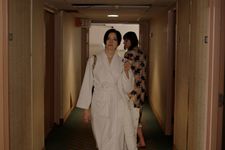 |
| Annabelle Dexter-Jones and Hari Nef in Bad Things Photo: courtesy of Shudder. A Shudder release |
“I think that they're hot for each other, and they're in love. And that's part of being human, but I'm not trying to titillate an audience member. I'm more trying to show the complexity of their relationships. Their sexuality isn't there as a fun ride. It's there as their humanity and part of their complicated relationships with each other.”
These are scenes what we see them getting changed, or we see them in bikinis, but the way the camera observes them means that they’re not sexualised, they’re just people who happen to not be covered up.
“I love that,” she says. “When you give different people the power to tell stories, it's just incredible how little camera shifts, or the way people are shot, become different, so it feels different. It's really fantastic to hear that you're receiving them as strong and vibrant women who are just in their bodies. It was funny too, because I remember at a certain point Gayle Rankin wanted to wear a bikini that was really cool but very transparent. And I was like, ‘Well, that does make sense for the character to have,’ and Gayle has great taste and great ideas, and she thinks really hard about everything. She brings so much creativity and thought to the character. Her choices are crazy and wild and interesting. But I felt like it was too transparent. And I really regret that now because I was trying to say, ‘Oh no, we can't show the body that way. You can't be naked, because that would be what a boy would do.’ But why shouldn't they? It should be okay to have your boobs out if you want to. And so I regret that now.”
The use of the chainsaw in the film is also interesting. There’s a fun moment in which a shot from The Texas Chain Saw Massacre is recreated, but when we see the chainsaw impact flesh, it doesn’t slice through it easily like it does in most films, it just cuts and bruises and glances off. It’s almost more disturbing because it’s realistic.
“The chainsaw was invented in Scotland as a gynaecological tool,” she points out. “It was for Caesarean section. They would hack right through your pelvic bone. So I couldn't not use that. It had too much symbolism.” One of the characters who is killed with it, she notes, is in “a sort of childbirth position” at the time.
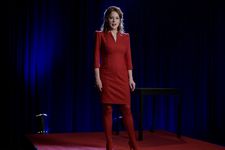 |
| Molly Ringwald in Bad Things Photo: Courtesy of Shudder. A Shudder release |
Something else I liked is that there's a point at which Ruthie escapes from the hotel and is on the outside, and that's usually a point at which we would feel that character was safe, but then the cold is a real threat. I don't think I've seen that in a film like this before.
“Yeah, it's interesting. And I loved the idea that just getting out of that space wasn't enough. That seemed very terrifying and truthful to me, because it wasn't like, the unhealthy possession of the mother was just contained to that space.
“We were waiting for that snow to come, and we were shooting in Ithaca, which usually has snow throughout the winter, and it just didn't come. So the producers and everybody worked so hard to keep reconfiguring the schedule to wait for the snow, and gloriously it came. And that yellow robe that Ruthie wears when she’s outside outside, that was all Gayle as well, thinking of what she would be wearing what would look good outside and making that work.
“It was a low budget love affair, and we were very confined up there in Ithaca, which is in central New York. And it was the middle of winter and it was during Covid, so that made everything really claustrophobic and hard. We all had masks on. And I found this hotel, which was just me looking forever and falling in love when I found this one was closed down. I taped a little note on the door and got a call and fell in love with the hotel. So I knew I would shoot there.
“Then it was just about getting everybody there. Everything was shut down, so they opened it up. It was on hold for quarantine students, so it could get shut down at any time. It's as if it wasn't hard enough to make an indie queer film, then you have a pandemic as well. But the actors all got to stay in another hotel that was slightly better, but also right next to that hotel, so we were all together and the actors got to spend a lot of time with each other. That was really wonderful for their characters, and for their history and that authenticity that they have together. And it was the usual roller-coaster of fighting to make art and asking too much of people and being surprised and wowed by everybody's genius and abilities.
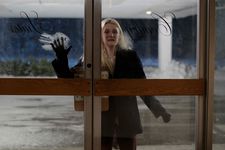 |
| Gayle Rankin in Bad Things Photo: courtesy of Shudder. A Shudder release |
“It's always scary to be alone in the hotel. The DP Grant [Greenberg] and I, we were going over the next day’s shoot or looking at locations after a day of shooting and then realising, ‘Oh, everybody's gone, and we're locked in.’ We couldn't get out, and that was really spooky. The hotel was spooky enough. You didn't want to be on a floor by yourself. One person quit because he got scared.”
Looking ahead is complicated, she says, because of the strike, but she does have plans.
“As soon as the world becomes more fair and everything settles, I am ready to move on. I'm making a trilogy about motherhood, but in between Bad Things and Daughter, I'm making a slasher film with older women, called Frigid.”





















